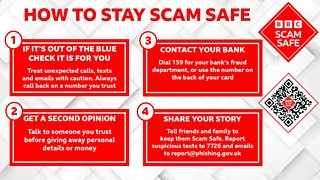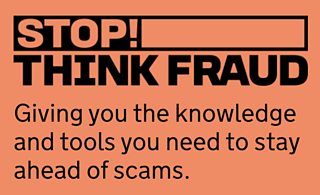How to Stay Scam Safe
HERE'S OUR ADVICE TO STAY SAFE FROM SCAMS

Our top 4 tips:
IF IT’S OUT OF THE BLUE, CHECK IT IS FOR YOU
Treat unexpected calls, texts and emails with caution. Always call back on a number you trust
GET A SECOND OPINION
Ask someone you trust what they think
CONTACT YOUR BANK
Dial 159 for your bank’s fraud department, or use the number on the back of your card
SHARE YOUR STORY
Tell friends and family to keep them Scam Safe.
Report suspicious texts to 7726 and emails to report@phishing.gov.uk
Stay Scam Safe With The Open University's Downloadable Interactive!
to download this resource which will help you stay scam safe. Make sure you share it with your friends and family.

The OU's Dr Dhouha Kbaier provides top tips and expert advice for staying safe from scams and has guidance on actions to take if you suspect you've been scammed.
Five Ways They Get You
Fraud accounts for 40% of all crime in England and Wales.

Radio 4’s fraud investigator Shari Vahl brings her expertise on fraud and scams to a new five-part series Five Ways They Get You.
Each episode focuses on a particular case from Shari’s archive of investigations, drilling into the often surprising and conniving frauds that leave bewildered victims in their wake.
To find out more, click here.
How Radio 1 Presenters Fell for Everyday Scams and How You Can Avoid Doing the Same!
A few weeks back, several Radio 1 presenters received a message from someone claiming to be Ella, a new personal assistant working for the big boss of 大象传媒 Music. Her profile picture looked friendly, and her message status was set to: ‘At the gym’. She gave off a familiar vibe.

The person on the other end of the conversation was actually Nick Stapleton from Scam Interceptors. As part of 大象传媒’s Scam Safe week, he wanted to prove that anybody could fall for a scam. “So I decided, why not try to see if I can scam some Radio 1 DJs?”
So did any of our DJs fall for Nick’s tricks? And how can we avoid falling for similar scams? Find out more by clicking here.
Stop! Think Fraud
Nobody is immune from fraud. The criminals behind it target people online and in their homes, often emotionally manipulating their victims before they steal money or personal data.

But there is something we can do. By staying vigilant and always taking a moment to stop, think and check whenever we’re approached, we can help to protect ourselves and each other from fraud.
To find the tools and gain the knowledge to stay ahead of scams, you can access the government's Stop! Think Fraud website by